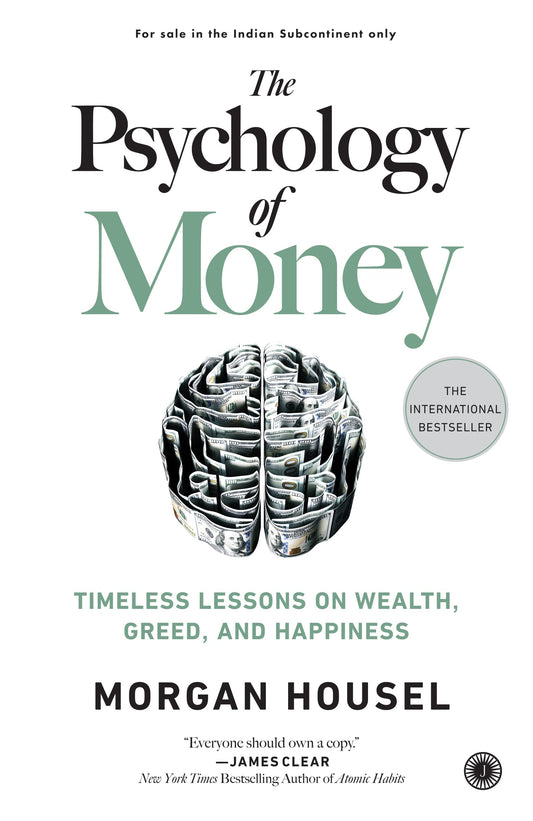Money$ Money₹ Money£ The Psychology of Money Review

This is my review of a fascinating book on finance called The Psychology of Money. Written by Morgan Housel who is a partner at the Collaborative Fund, this book focuses specifically on personal finance - how to make, manage and maintain your wealth. The book offers a deep dive into investor behavior and the mindset required to stay wealthy using a variety of analysis points and real world examples. Here are a few of my favourite learnings from The Psychology of Money:
1. Mindset - The Psychology of Money gave me a brand new perspective on investor values and made me understand the importance of developing a stoic mindset with an optimistic outlook whilst investing as it is a fundamental aspect of creating a long term track record of success. Housel also emphasizes the need for cultivating moderation whilst managing money, which will in turn be reflected in one's lifestyle. The myriad problems of becoming too attached to successes and failures are highlighted through multiple examples to show that it eventually leads to the investor's downfall. One such fascinating case is that of Jesse Livermore - an American investor who by a stroke of genius, made more than $3 billion in a single day during the Great Depression, making him one of the richest men in the world. However, this caused Livermore to become overconfident and to make increasingly riskier investments, eventually going bankrupt and ending his life by suicide. While this case is quite extreme, it highlights the importance of remaining unswayed by the various market noises.
2. Strategy - A key idea that Housel puts forth is that oftentimes important financial decisions are not actually made rationally, but in informal settings heavily influenced by our personal ego, lifestyle and others’ opinions. Thus, the decisions that we make are often not in our best interests. Furthermore, he argues that panic selling stocks due to our inherent aversion of failure is not a very good solution in the long term, because with the case of most stocks, it is just a temporary lull before the price starts to rise again. He also shows that even amongst the most successful investors, a majority of their returns come from a few excellent investments compared to most of the other investments on their portfolio which are usually average in terms of their return. This has been demonstrated by Warren Buffett who mentioned in the Berkshire Hathaway shareholder meeting in 2013 that most of his money was made from just 10 stocks out of the 400 to 500 stocks he has owned during his life. This surprised me because previously I had thought that the method to become successful in the stock market was to ensure every investment to be very profitable and to sell badly performing stocks immediately even if the losses incurred are only in the short term.
3. Compounding - This is an extremely important concept and is often highlighted by people who invest in financial markets. Compounding also applies to the concept of savings, for which Housel is a strong proponent as he considers it not only to be a safety net for future financial troubles, but also as a means to increase our independence. As stated in the book, money's greatest intrinsic value is to give you control over your time. I have come across this idea in Tim Ferris's The 4 Hour Workweek as well, where along with time independence, location independence is also highlighted as being a key to happiness. The power of compounding lies in consistency. Warren Buffett's ability to consistently invest well for more than 82 years has in fact, led him to accumulate $84.2 billion out of his net worth of $84.5 billion at the time of writing the book, after his 50th birthday. The reason compounding is often overlooked is its counterintuitive nature and hidden potential. Its power lies in the patient execution of investment strategies with a long term goal in mind, therefore making it difficult to implement.
However, a slight fault I have with the book is that I don't fully concur with Housel's ideology of a moderate and patient investing mindset to be the model for the general public. In my opinion, unless a person has gone through testing financial trials that indicate to them that this path of moderacy is the key to success, most others will be willing to take risks and focus more on short term gains, especially with the high-risk high-return stock market. While their portfolios might include long term investments in bonds and mutual funds - which are also affected by the power of compounding - few active investors might have the patience necessary to play the long game in the stock market, as can be seen with the growing popularity for day trading over the past few years.
Ultimately, I found the Psychology of Money to be a refreshing read, exposing me to multiple novel ideas with regards to investor behaviour and made me rethink my previously held notions about the power of compounding and designing investment strategies. I definitely recommend this book if you are looking for an easy to read finance book that will also challenge your notions and stimulate your understanding of money.

Comments
Post a Comment